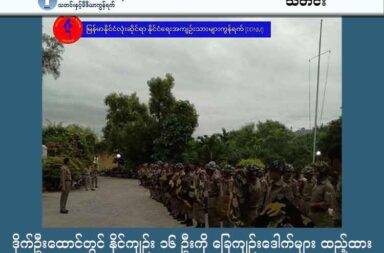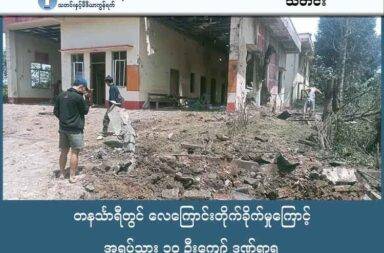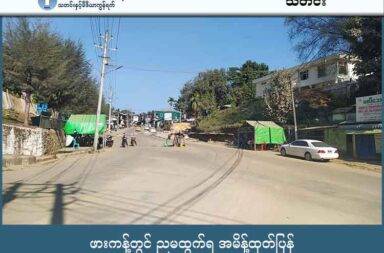‘Everything is Difficult’ for Refugees and IDPs Following Aid Cuts
Some 450,000 displaced people remain unable to return home amid ongoing militarization and conflict in Burma, civil society says.
By NETWORK MEDIA GROUP (NMG)
Monday, June 24, 2019
Human rights activists and 15 civil society organizations have called on the Burmese government to halt offensives in ethnic states and on the international community to stop the abandonment of internally displaced people (IDPs) and refugees.
Some 450,000 IDPs are still unable to return to their homes in Burma, yet international NGOs have gradually reduced their assistance to displaced people, particularly those outside of government-controlled areas, the representatives said.
Their statements came in coordination with the June 20 launch of the report “There is No One Who Does Not Miss Home,” which explored protracted displacement in Burma.
According to the report, there are nearly 106,000 IDPs in Kachin and northern Shan states, nearly 280,000 IDPs in Karen and Mon states and nearly 97,000 refugees in camps along the Thai border.
“Food rations have been reducing in refugee camps since EAOs [ethnic armed organizations] signed ceasefire agreements in 2012,” Mee Mee, who is working with the Karenni Women Organization, told NMG. “A refugee gets 200 baht per month (less than US$6) in Karen and Karenni refugee camps along the Thai-Burma border. Education and healthcare assistance has also been reduced. As refugees, we cannot go work outside the refugee camp. We have lost hope. Many refugees suffer from mental trauma,” she explained.
Refugees cannot return to their homes due to the presence of landmines, as well as increased militarization in the areas where they used to live. Civil society is demanding that that for a safe and dignified return, security, homes, land ownership, education and healthcare must be guaranteed. This must be made a priority in the peace process, they said.
Maji Yaw Htong, secretary of the Jor (1) IDP camp in Namkham, northern Shan State, told NMG that the residents of his camp also could not go back to their homes in Kachin State’s Mansi Township.
“It’s like their village is located on the front line and in the battle zone… Their village is already damaged. Security is not guaranteed for them,” he explained. “They can return home after peace is restore and landmines are removed around the village.”
Another challenge is that IDPs and refugees frequently do not have Burmese national ID cards or Thai ID, explained Sai Kwan Khur, a teacher in the Kong Jor camp on the Thai-Burma border, which is one of the camps along the Shan border home to a total of 6,000 displaced people.
International NGOs halted assistance to Shan IDPs in 2017, despite objections from Shan civil society, which demands it be reinstated.
“[IDPs and refugees] cannot return home, but it is difficult to live here. They are in the middle of the problem. Their food rations have already been cut off,” he told NMG, adding that as a teacher, he had to buy his own rice and food, despite a very low salary. “We have to buy everything. Refugees are really facing difficulties. Currently, we need textbooks. Sometimes we have to share books and pencils. Everything is difficult,” Sai Kwan Khur said.
In the statement released by 15 civil society organizations—including Kachin, Karen, Karenni, Mon, Pa-O, Shan and Ta’ang groups—the government and army are called on to stop military offensives, human rights violations and land confiscation in ethnic areas, as well as to amend the 2008 Constitution in order to work toward building a genuine federal democratic Union.


